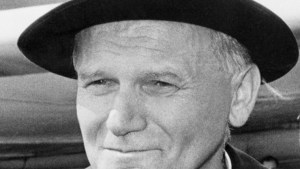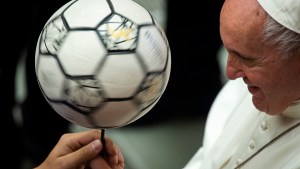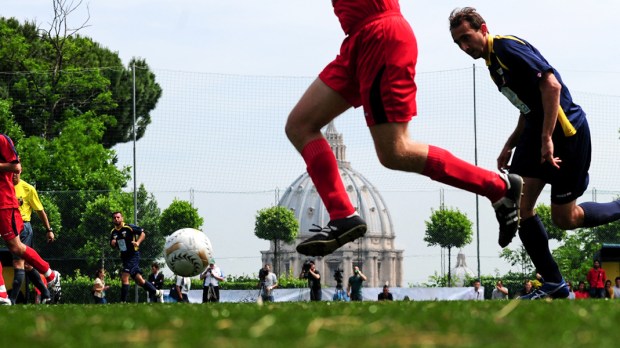Summer is here in full force in the northern hemisphere! Long sunny days and, for some of us, the freedom of school vacation invite us to spend more time in the great outdoors: playing sports, swimming, camping, fishing … or perhaps we’re more attracted to spending lazy hours in a hammock with a glass of something cool and refreshing. Others prefer to stay indoors, with fans or air conditioning on full blast and Netflix or video games to pass the time.
While it’s important for our health to have a time for both exercise and physical rest, we might be surprised at the enthusiasm with which the Church — and more specifically, certain popes — have praised and encouraged the practice of sports. This shouldn’t be entirely unexpected, as several 20th- and 21st-century popes were themselves athletes. Those of us who remember St. John Paul II’s papacy (1978-2005) will recall that, even as pope, he was an avid hiker and skier, and had earlier been a soccer player and gymnast. Pope Francis is known for his dedication to soccer more as a fan than as a player, although he played the sport in his youth. Pius XI (1922-39) was an alpinist, and Pius XII (1939-58) was a mountaineer and a boxer.
A forgotten side of Pope Pius XII
Pius XII is mostly known today for the controversies surrounding his behavior during World War II in relation to the Nazis and the Holocaust, although there is a growing amount of evidence that seems to largely exonerate him of accusations of inaction or complicity. Nonetheless, there is much more to his papacy, and in the context of this article, we can point to what practically amounts to a “theology” of sports.
The human body, he points out, is a temple of the Holy Spirit (see 1 Cor. 6:20), so taking care of it and harmoniously developing its capacities is a way to glorify God. He explains that sports are a way to help us grow in both human and spiritual virtues. At the same time, he exhorts us to remember that sports are not the ultimate meaning of life, but only a means to an end, which is the full integral development of the human person. Sports must take a subordinate role, so we can give God and our family their proper place.
These ideas are illustrated by nine striking quotes from Pius XII on sports, taken from two of his addresses: one to Italian athletes on May 20, 1945 (the first 5 quotes), and another to participants in the National Italian Scientific Congress for Sports and Gymnastics Activities, November 8, 1952 (the last 4). Read them, and you’ll never think of sports the same way again!
Pius XII on sports
Glorify the Lord in your body, the temple of the Holy Spirit! [see 1 Cor. 6:20] … We must love and cultivate the dignity, harmony, and chaste beauty of this temple: “Lord, I love the refuge of your house, the site of the dwelling-place of your glory” (Psalm 26,8). So what is, first of all, the function and goal of sports, understood in a healthy and Christian way, if not to cultivate the dignity and harmony of the human body, to grow in health, strength, agility, and grace?
Sports are an efficacious antidote to laziness and a comfortable life; it awakens a sense of order and educates us to self-examination, self control, and contempt of danger without self-importance or pusillanimity. Thus you can see how it already goes beyond mere physical strength, to lead to moral strength and greatness.
Healthily tiring out the body in order to rest the mind and dispose it to new tasks, tuning the senses to acquire a greater intensity of insight of the intellectual faculties, exercising the muscles and getting used to effort in order to forge character and form a will that is strong and elastic as steel: such was the idea that [Pope Pius XI] formed about sports.
At the service of a healthy, robust and intense life, at the service of a more fruitful activity in the fulfilment of the duties of one’s own state, sports can and must be at the service of God.
Sports and gymnastics have, as their immediate aim, to educate, develop and strengthen the body …; as their most remote aim, the use, by the soul, of the body thus prepared for the development of the interior or exterior life of the person; and as their deepest aim, to contribute to a person’s perfection; finally, as the supreme aim of man in general and common to all forms of human activity, to bring man closer to God.
In reality, what good would it do to use and develop the body, its energies, and its beauty, if it were not at the service of something more noble and lasting, which is the soul? If sports do not serve the soul, they are only a vain movement of limbs, an ostentation of short-lived beauty, an ephemeral joy. … Founded on these principles, … in the estimation of sport and gymnastics, in judging the person of the athletes, in admiring their achievements, the observance of this hierarchy of values must be taken as a fundamental criterion, so that the greatest value is not attributed to the one who has the strongest and most agile muscles, but to those who also show the most ready ability to submit [their body] to the dominion of the spirit.
Truth and probity, love, justice and fairness, moral integrity and natural modesty, due care of life and health, of family and profession, of good name and true honor, must not be subordinated to sports activities, to their victories and glories. As in other arts and professions, so also in sport, it is an immutable law that a successful outcome is not a sure guarantee of its moral rectitude.
Before anything else, give God the honor that is due to him, and above all keep the day of the Lord holy, since sports do not exempt you from religious obligations. “I am the Lord your God” — said the Most High in the Decalogue — “You shall have no other God before me,” that is, not even one’s own body in physical exercise and sports: it would almost be a return to paganism. Likewise, the fourth commandment, which expresses and protects the harmony intended by the Creator within the family, recalls fidelity to family obligations, which must take precedence over the supposed demands of sports and sports associations.
Sports are a school of loyalty, courage, endurance, resoluteness, universal brotherhood—all natural virtues, but which provide the supernatural virtues with a solid foundation, and prepare us to bear the burden of the most serious responsibilities without weakness.
In short, for Catholics, sports are not just a way to have fun: they’re a way to give glory to God through the development of healthy bodies and virtuous souls, preparing us as well for greater things. This is why the pope also points out that we cannot let sports get in the way of our observance of our duties to God—Sunday Mass included, as the archbishop of Detroit recently reminded his flock, by cancelling all diocesan school sports events on Sundays—or our duties to our family.
So, let’s enjoy our summer activities, remembering that everything we have comes from God, and all of it should ultimately be enjoyed in a way that glorifies Him and leads us back to Him.

Read more:
10 Inspiring sports quotes by famous people–including two popes

Read more:
Sports a remedy to media-induced isolation, pope says

